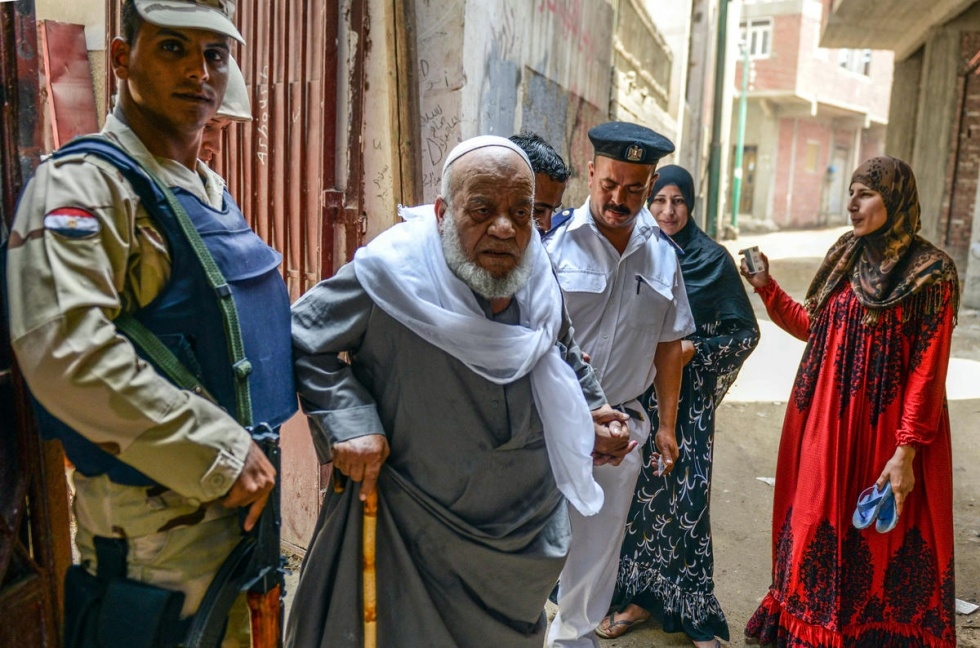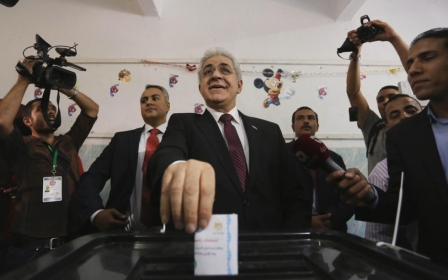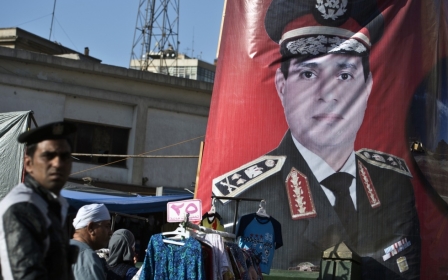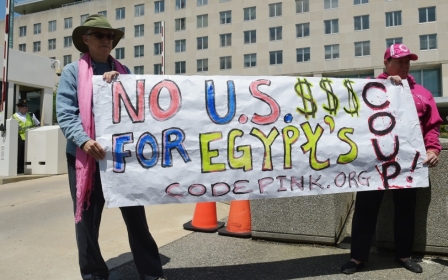Egyptian political 'tragicomedy' plays on

Marx famously wrote that history repeats itself, "first as tragedy, then as farce". Ever the innovators, Egyptians have managed to combine both elements in one degenerative political transition doomed to recall the spectre of authoritarianism in their country.
For those who supported last summer's military coup in Egypt that overthrew an elected president and brought a swift end to the country's revolutionary moment, the upcoming coronation of Abdel Fattah al-Sisi will be their crowning achievement. Even more troubling than the deafening cheers in favour of Sisi's ascension has been the tendency by many observers to confer upon the upcoming presidential elections in Egypt an air of legitimacy they have neither earned nor deserved.
Much of the media coverage of Egypt's elections appears to be stuck in the tumultuous yet relatively open political climate that was ushered in after Hosni Mubarak's fall in early 2011 and continued through multiple electoral cycles that included referenda, parliamentary and presidential votes.
The painstaking coverage of campaign rallies, televised interviews with candidates, and electoral programmes notwithstanding, there is nothing that would suggest that the current elections are occurring in the climate of relative political openness and freedom of choice for millions of Egyptians that marked those earlier elections. The claim made by Sisi's supporters and parroted by world leaders from US Secretary of State John Kerry to EU foreign policy chief Catherine Ashton that the military's intervention signalled another milestone along the revolutionary path stands in stark contrast to the climate of fear perpetuated with clear intentionality on the part of the old regime to restore its unassailable status.
Tragedy and farce
New MEE newsletter: Jerusalem Dispatch
Sign up to get the latest insights and analysis on Israel-Palestine, alongside Turkey Unpacked and other MEE newsletters
In the first major test to its supposed democratic inclinations, in January the interim government arrested activists who advocated a "no" vote on the referendum to approve a new constitution crafted in large part by the military. More than such direct measures, however, Egypt's security forces have succeeded in constructing a repressive climate marked by fear and paranoia, ensuring that political choices expressed by people at this time are hardly reflective of their genuine preferences.
The hundreds of people killed by security forces on Egypt's streets since last July were joined in recent weeks by hundreds more whose execution was determined by judicial order. In less than a year, a reported 23,000 people have been imprisoned under the most spurious political charges.
Most have been denied their due process rights and reports of torture and sexual assault in custody have become widespread. The military rulers' war on information has seen to it that, virtually overnight, Egypt has become one of the most dangerous places in the world for journalists. The trial of imprisoned Al-Jazeera reporters has been a colossal mess that could be mistaken for a comedic parody were it not for the appalling images of its caged victims. Tragedy and farce, all in one.
That the image of a democratic transition has been trumpeted throughout these elections is not the fault of the media alone. Rather, the political theatre unfolding in Egypt over the past year has involved a broad spectrum of actors all playing their parts dutifully in this crudely conceived play.
As numerous revolutionary youth activists have repeatedly conceded, their opposition campaign targeting Morsi was at various stages infiltrated and coopted by Egypt's state intelligence agencies. Some youth leaders knowingly legitimised the efforts by repressive state institutions to overthrow Morsi forcibly by riding a wave of popular mobilisation. Mohamed El-Baradei also contributed to the process of legitimising the military coup with his enthusiastic support for Morsi's overthrow.
After having cast doubts over the credibility of the 2012 presidential elections for having taken place under the military's supervision, El-Baradei had no misgivings about accepting an appointment to the vice-presidency by a coup leader from that same military, in the process offering the liberal, civilian facade of what was to become the most repressive regime in Egypt's modern history.
Egyptian Salafis led by the Nour Party have provided their enthusiastic support for everything from the violent crackdown against anti-coup protesters to the emerging Sisi presidency. Hoping to avoid the same fate as the outlawed and repressed Muslim Brotherhood, Nour has been all too glad to lend its name as the token Islamist force backing what is otherwise clear to be the military's attempts to repress all independent political forces in Egypt.
Also playing his part in the unfolding tragicomedy of Egyptian politics is Hamdeen Sabbahi, whose presidential candidacy stands no actual chance of challenging Sisi's claim to power. Far from a "two horse race", Sabbahi's only accomplishment in this election has been to confer an air of democratic legitimacy upon an emerging authoritarian order.
Recent history tells us that none of these actors is likely to survive the reemergence of a state determined to restrain civil society like never before. Many of the youth activists who cheered on the coming of the military now languish in its prisons. Once El-Baradei fulfilled his purpose as the coup's liberal face, he was discredited, ostracised and shipped back to Europe. Upon playing their part in Sisi's election, the Nour Party and Sabahi will inevitably be relegated to political obscurity, becoming no more than mere footnotes in Egypt's modern history.
The fact of the matter is that it would be disingenuous to ignore the broader authoritarian processes at work and instead shift the focus to debating the particulars of an inconsequential political contest that has been constructed precisely to mask those processes. Sisi justifies the military's intervention against Morsi in large part as an attempt to restore security and economic prosperity to Egypt. But one year of interim military rule has proven to be a spectacular failure on both of those fronts.
Moreover, the alarming and systematic assault on the rights of Egyptians in pursuit of those goals obscures an underlying objective upon which the revolution was built: the restoration of basic human dignity that had been eroded following decades of political and economic degradation by successive military rulers. The premise of the Sisi presidency appears to be that Egyptians are willing to check their dignity at the door of political stability and economic recovery. That gamble proved to be illusory once. Irrespective of the thin veneer of democracy, it may prove so yet again.
- Abdullah Al-Arian is assistant professor of history at Georgetown University, School of Foreign Service in Qatar and author of Answering the Call: Popular Islamic Activism in Sadat's Egypt.
The views expressed in this article belong to the author and do not necessarily reflect the editorial policy of Middle East Eye.
This article was originally published on Al-Jazeera. Republished with permission from the author.
Photo credit: Egyptian voters come to vote during the third day of the Egyptian presidential election (AA)
Middle East Eye delivers independent and unrivalled coverage and analysis of the Middle East, North Africa and beyond. To learn more about republishing this content and the associated fees, please fill out this form. More about MEE can be found here.





